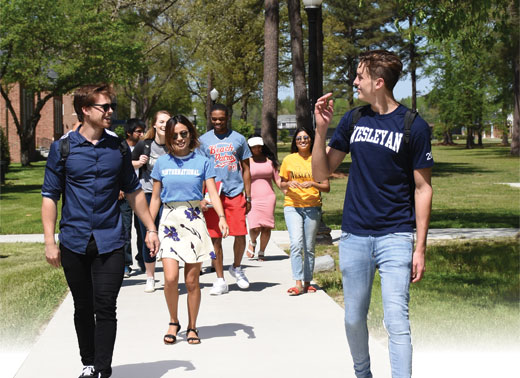
ROCKY MOUNT, NORTH CAROLINA – North Carolina Wesleyan University (NCWU) has been ranked among the 2024 Best Online Master’s in Business Administration (MBA) by U.S. News & World Report.
U.S. News assessed schools in the Best Online MBA Programs category based on a variety of objective factors, such as student engagement, faculty credentials, as well as services and technologies. According to their website, NC Wesleyan University was among more than 1,800 programs surveyed and only regionally accredited institution whose programs are offered mostly or entirely online were evaluated.
Professor Dr. Paul Ewell, Program Coordinator for the MBA program states, “Our MBA is more than a degree. It’s a gateway to the future of business.
“You’ll learn from the best and brightest in the field, and apply your skills to real-world challenges. You’ll also enjoy the flexibility and convenience of a program that fits your lifestyle and goals”, stated Ewell.
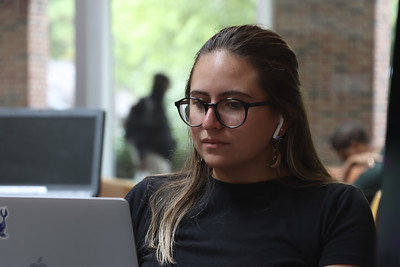
NC Wesleyan’s Master of Business Administration program is one of the most popular graduate programs at the University and was recently is one of the only private, non-profit universities currently offering an online MBA degree in the eastern NC region. The program is very affordable and offers many benefits including: rolling admissions with 100% online classes starting every eight weeks, finish in as little as 12 months, one-on-one mentoring, supportive faculty who have real-world experience offering applied assignments and career assistance. The program offers concentrations in Information Security, Executive Leadership, and Supply Chain Management. The program was also named by Forbes as One of the 10 Best Online MBA Programs of 2023! To learn more about admission requirements and curriculum information, visit ncwu.edu/mba.
Prospective students can see how NCWU compares to other institutions and how the rankings are calculated on USNews.com.
About U.S. News & World Report
U.S. News & World Report is the global leader in quality rankings that empower consumers, business leaders and policy officials to make better, more informed decisions about important issues affecting their lives and communities. A multifaceted digital media company with Education, Health, Money, Travel, Cars, News, Real Estate and 360 Reviews platforms, U.S. News provides rankings, independent reporting, data journalism, consumer advice and U.S. News Live events. More than 40 million people visit USNews.com each month for research and guidance. Founded in 1933, U.S. News is headquartered in Washington, D.C.
Spring 2024 Humanities Speaker Series with Dr. Courtney Hoffman
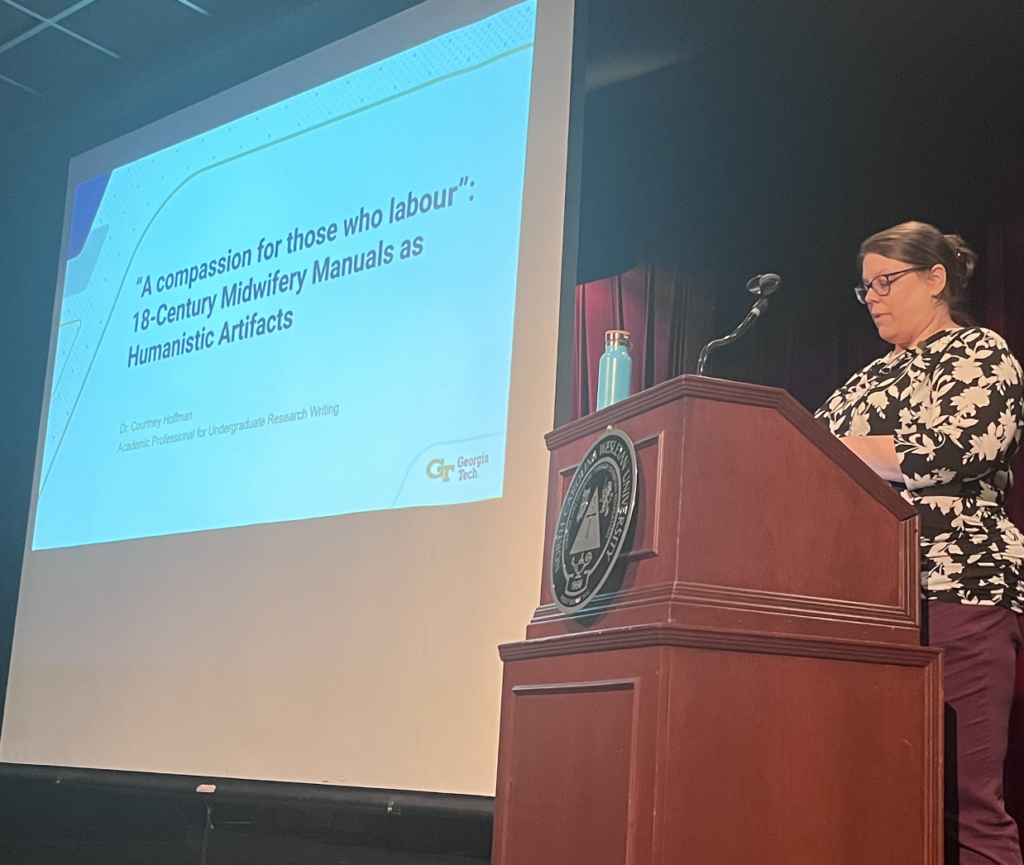
On Wednesday, February 29, 2024, Dr. Courtney Hoffman of Georgia Tech delivered the Spring 2024 Humanities Speaker Series Lecture in Powers Auditorium.
Dr. Hoffman’s talk, “‘A compassion for those that labour’: 18th-Century Midwifery Manuals as Humanistic Artifacts,” argues that, while advances in medical treatment have led to safer outcomes in childbirth since the 18th century, the rhetoric surrounding midwifery, particularly regarding interactions with pregnant people, remains steeped in an ethics of care that has its roots in the pre-industrial era. 21st-century midwifery ethics of care advocates for patient education, autonomy, and treatment plans, founded on developing relationships between midwife and the birthing person. Such relationships are built on empathy and derive from the rhetoric of sensibility and fellow-feeling that pervaded 18th-century culture and that is embedded in the midwifery manuals of the era. Dr. Hoffman suggested that modern midwifery discourse displays the lingering effects of an 18th-century care ethics with the understanding that, while the technologies have changed, concerns surrounding successful birth practices have not. Her talk explored ethics of care in 18th-century midwifery manuals, demonstrating the value of studying historical technical documents as artifacts of humanistic and policy relevance, particularly as recent legal decisions in the United States emphasize history and tradition as the basis of cultural practices.
New Single Released Through NCWU’s 301 North Records
Raleigh area band, Soul Chatter (featuring artist Lonely Boarders) released their newest single titled, “Mr. Inside” through 301 North Records today! Tony Sawyer, Assistant Professor of Music Production at NC Wesleyan University helped with production and worked as the mixing and mastering engineer on the project. The single is now available on all streaming services including Spotify, YouTube Music, Apple Music, iTunes and many others.
301 North Records is the record label of NC Wesleyan University. Please visit the 301 North Records playlists on Spotify and YouTube Music to hear all our artists’ music.

NCWU Welcomes Ronald Cotton
North Carolina Wesleyan University will welcome Ronald Cotton of Burlington, North Carolina on Thursday, February 15 from 6:30 p.m. to 8:00 p.m. in Powers Recital Hall at The Dunn Center. Serving 11 years in prison for a crime he did not commit, Cotton was falsely accused of raping Jennifer Thompson. At the time, Thompson was an Elon University student. Cotton’s wrongful conviction was largely based on faulty eyewitness identification procedures. Following his exoneration, Ms. Thompson and Mr. Cotton became friends and advocates for criminal justice reform.
Considered among the most famous DNA exonerations in U.S. history! Watch a two-part 60 Minutes episode about this case by clicking here.
Attendees of this event will witness the type of interaction an educated populace should demonstrate, but more importantly, how to engage in issues that sometimes divide us as a nation.
Open to the public. This event will provide students with the experience of interacting with their social community beyond what they read in textbooks. Discussing delicate issues of this type is both educational and engaging for our students and the community at large.
Attendees will have the opportunity to meet Mr. Cotton during a reception immediately following at 8:00 p.m. in the Powers Hall lobby.
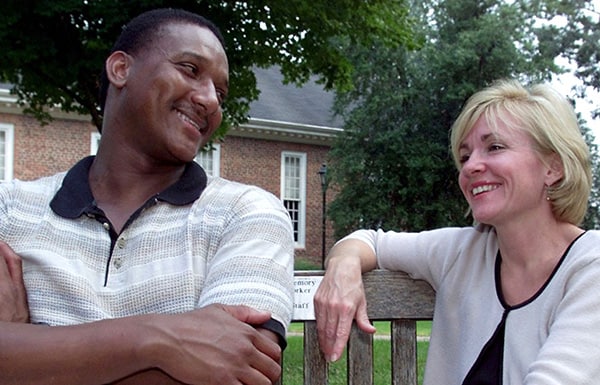
NC Wesleyan Placing Students’ Finances First
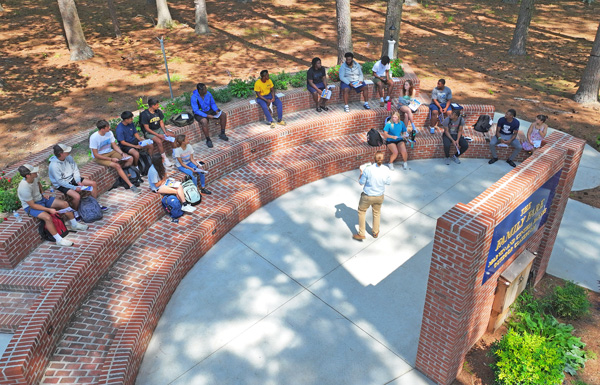
ROCKY MOUNT, NORTH CAROLINA – North Carolina Wesleyan University is proactively addressing FAFSA financial aid setbacks to meet the needs of our students and families. The University has announced it is moving forward and investing in its students in the midst of the continued federal delays.
“It is our commitment to provide students with a transparent and affordable financial aid package shortly after they are accepted. To uphold this commitment, we have developed a plan to help bridge the gap” stated President Duff.
The U.S. Department of Education announced, “The Department will begin transmitting batches of FAFSA information—known as the Institutional Student Information Record or ISIR—to these colleges in the first half of March.”
In an effort to be proactive, North Carolina Wesleyan University will be providing estimated financial aid and award packages starting in February. This initiative will streamline tuition and award packages, providing students assurance to financing their education, so they can make informed decisions. If students qualify for additional aid once the FAFSA is finalized, NCWU will adjust those student’s packages accordingly.
Visit the Department of Education website for more details: studentaid.gov/announcements-events/fafsa-support
Information for students that have already been accepted and deposited
If you have already committed to attending NC Wesleyan, complete our 2024-2025 SAI Information Form to apply. You’ll need your NCWU Student ID to complete the form. An email will be sent from the Office of Financial Aid within 48 hours of receipt of your completed form. An estimated award letter will be emailed starting mid-February.
Information for prospective students
For prospective students who are considering NC Wesleyan, APPLY TODAY and take advantage of this financial aid opportunity. Don’t wait on FAFSA, choose the University that takes care of their students NOW!
Nursing Program Awarded Funds for Expansion

North Carolina Wesleyan University has been awarded $500,000 in funding by the Golden LEAF Board of Directors. These funds will be utilized to renovate a campus building that will house a new baccalaureate nursing program. READ MORE >
NC Wesleyan University Honors List 2023
North Carolina Wesleyan University’s Fall 2023 President’s Honor List and President’s List are issued at the end of the fall and spring semesters. To be eligible for inclusion, a student must carry a minimum of 12 semester hours on the “A-F” grading system, with no grades of “INC.” A student must attain a 3.75 grade point average with no grade below “C” for the President’s Honor List and a 3.25 grade point average with no grade below “C” for the President’s List for the semester. Congratulations to these students for an outstanding academic year!
Fall 2023 President’s Honor List
Molly A. Alejandrino
Bander S. Alrahimi
Jacob M. Anderson
Jocelyn Andrews
Thomas Ashworth-Bradford
Morgan B. Aycock
Kaley W. Bailey
Cameron D. Baker
Allison Bargoil
Kismet C. Bass
Brandy D. Begley
Nayra A. Bernacki
Yubraj Bhandari
Mark A. Bieber
Alvaro Blanco Toro
Matteo V. Bontempo
Kristin L. Booher-Myatt
Anna M. Brake
Ishna Branch
Zoe R. Branstetter
Jehnnisa D. Braswell
Constance J. Bunch
Mary A. Butler
Joaquin Cabello
Sean M. Canary
Agustin Cardaci
Leopoldo Cardelli
Tiffany M. Cassell
Christen B. Caudill
Francesco Cavicchia
Shequanna B. Chambers
Kennedy R. Clark
Shantique S. Clark
Francisco Cobo
Lexie M. Collins
Delfina Conde Latini
Candela Conde Latini
Anthony R. Conner
Adam S. Conte
Tanya R. Cooke
Pablo Jesus Cornejo Jimenez
Ryan E. Cornelius
Cassidy Crain
Ashley N. Cuozzo
Cullen N. Davis
Carleesa A. Davis
Danielle L. Davis
Marion G. Denny
Lisa D. Dew
Harjot S. Dharni
Luz Dibar
Nirrasha D. Dingle
Vendela M. Dolsenius
Dawn Drew
Olivia R. Dyjewski
Benjamin Eckell
Tiffany D. Edmond
Justo Esponda Neuss
Carson M. Evans
Baileigh A. Evans
Leigh A. Evans
Andrea Fanzaga
David L. Fate
Fabio Felli
Maria C. Fernandez Laurita
Miranda N. Ferrell
Brittan D. Fox
Dayana Garcia Cruz
Katie Gutierrez-Rayo
James M. Gwaltney
Anthony L. Hale
Frances E. Hanshew
Blaire M. Harley
Gavin L. Harrell
Ciara L. Harrington
Rose I. Hernandez
Juan M. Herrera Lanzi
Thato K. Holmes
Mariah Hooper
Braden Humphrey
Justin Q. Huynh
Maxima A. Iglesias
Sarah E. Ingram
Alessandro Iriu
LaShanda Jacobs
Felix L. Jenkins
Ashley Johnson
Sherika N. Jones
Layali S. Kasem
Alexis N. Keegan
Veronica Kent
Zion E. King
Bria S. King
Tierra L. Lane
Noah T. Larkin
Theodora J. Lee
McKaylah A. Lee
Dirk W. Lehman
Pierre Leo
Ashley N. Leturgez
Branson B. Long
Elizabeth L. Lopez
Luca Lucidi
Elisa Mariotti
Ethan Marobela
Brandy M. Massey
Lawrence J. Mattingly
Morgan E. May
Tiffany L. McCabe
Hannah G. McGee
Timothy J. McGraw
Wilson P. McMinn
Aurora P. Melo
Bernardo Mendia Messineo
Shabria K. Merchinson
Christopher S. Mitchell
Amanda C. Modlin
Lilian A. Monroy
Makayla R. Moore
Kevin O. Moreno
Tshepo Mosarwa
Kirsten L. Myers
Gianluca Nanni
Connor J. Newell
Nu T. Nguyen
Linda T. Nhiwatiwa
Kiley R. Nielsen
Shafiq J. Nuijts
Yamila Ordo
Kelsi K. Oyer
Quincey L. Packer II
Emily G. Patton
Yann Penvern
Ignacio Perco
Julian Pfefferman
Juan M. Pielach
Ashia L. Pierce
Disheika C. Powell
Michael R. Pullen
Jamir E. Pulley
Markia Purvis
Adrian Racedo Perdomo
Catalina Ramella
Laura G. Ramsaroop
Francesco Raparo
Anna E. Ray
Mary K. Raynor
Alexis M. Reinert
Agustina Requejo
Robert H. Rice
Tabitha S. Richardson
Ashley R. Riley
Juan Agustin Rivas Cappielo
Khalil E. Robertson
Alberto Robinelli
Susanne Rose
Isaiah L. Rowe
Claudemir J. Ruthes
Maria Gabriela Salazar Villasmil
Seraj D. Salim
Matthew C. Sampson Jr.
Nicolas L. Sautua
Delfina Scarpinelli Jardel
Julie M. Schoormans
Cassie T. Scott
Victoria Seggiaro Parma
Daniella K. Sehannie
Benjamin C. Sellers
Shella Senecharles
Cole S. Sheehan
Sagun K. Simha Thakuri
Nadia J. Simmons
Jonathan L. Skinner
Landon C. Smith
Dalma S. Smith
Mathilda J. Smith
Macy N. Smith
Kenneth J. Snowden
Franco Sorella
Fatin A. Soufan
Deonna A. Starks
Emma C. Stone
Noah J. Strange
Sarah F. Strickland
Key A. Strickland
Anaya S. Sule
Charlene A. Tabron
Kelsey M. Tackett
Simiyon F. Tamang
Eunice F. Tant
Allyson Taylor
Daija R. Temple
Makenzie A. Thornton
Shanice R. Tillery
Abby N. Todd
Crystal N. Twiddy
Nicholas V. Vick
Desiree Walker
Grayson P. Wallace
Morgan L. Waters
Jacie J. Webb
Moses J. West
Sonya G. Wester
Ethan S. Wheeless
Alexis P. Whitfield
Cecil Whitt
Keturah S. Wicks
Kentwan T. Williams
Jessica Y. Williams
Edward J. Williams
Kaitlin E. Williams
Michala J. Winstead
Samantha E. Winstead
Isabel J. Wooten
Preston C. Workman
Isaiah B. Zaino
Alfonso Zerpa
Bohdan Zhylchuk
Fall 2023 President’s List
Sophia G. Adame
Deonna G. Adams
Trinity G. Adams
Adefisayo T. Adebimpe
Donald G. Alligood
Pablo Aranguren Pelaez
Jayden J. Armstrong
Nickki L. Austin
Karen V. Aviles
Seth O. Badders
Sujata Bajagain
Tyyeest S. Baker
Jalen Baldwin
Sarah R. Banks
Kimberley S. Barker
Joyce W. Barron
Julian Barros Gonzalez
Philly Barungi
Tyson P. Bass
Asia Z. Battle
Jomanda Battle
Juana M. Baudrix
Gregor M. Baum
Lillie T. Baumbach
Destiney S. Bell
Yutaka S. Bell Jr.
Blake C. Bennett
Aquiles Bernal
Lucas Bernard
Sheniya M. Bethea
Orri F. Bjornsson
Angela S. Bland
Haden L. Blanks
Paula Boero Gonçalves
Facundo M. Boismoreau Darquier
Garrett O. Bolden
Sianna K. Boulden
Comaggio J. Brady
Bennie W. Brake III
Brody A. Brice
Catherine N. Briley
Colebrin A. Brinkley
Andrew M. Brown
Amari B. Brown
Aden L. Brown
Alexander A. Bruno
Caitlyn D. Butler
Tomas Cabrera
Martin J. Cardestig
Hannah M. Carter
Sheila M. Casiano
Kylee J. Casola
Santiago Castilla Sastre
Ernesto J. Castillo-Platero
Sindy Chavez-Pullman
Ashanti T. Clanton
Rue E. Coley
Kayla L. Collins
Brandi N. Collins
Matthew B. Coltren
Maria A. Contreras
Alby S. Corona Alvarez
Cameron L. Crew
Charissa N. Cuozzo-Edwards
Osei K. Darko
Justin W. Davis
Carmilus M. Davis
Matias De Miguel
Hattley Deans
Asiaa L. Deas
Bastien Dechamps
Brad Deeren
Santiago Del Valle Vicedo
Jose A. Del Vecchio
Jaydon T. Denmark
Joshua C. Denton
Candela M. Diaz Babilani
Jasmine G. Dozier
Christian B. Drumgoole
Landon Duff
Evan T. Easton
Alexis G. Edgerton
Regina S. Edmondson
Latoya Edwards
Fiona A. Egan
Andrea Elaez Miranda
Wessel J. Eldering
Caleb J. Elias
Virginia Ellis
Wanza L. Epps
Janeth Escobar-Vasquez
Marquis J. Eskew
Finlay J. Evans
Victoria Farji
Mckayla J. Farrow
Tiago Feler
Mason C. Fischer
Bethan N. Fothergill
Wendy D. Franks
Linster N. Frazier
Jonathan M. Frye
Sakeena Frye
Travis J. Gamache
David S. Gamble
Julian E. Gamboa
Briyith V. Garcia
Eduardo Garcia Rubio
Elijah M. Garner
Montevious Garrett
Alexus D. George
Anthony German Jr.
Thiago E. Gianico
Trinity A. Gibbons
Braxtyn C. Green
Niana A. Gunter
Melanie A. Guzman Gonzalez
Jaycie D. Hadnott
Tessie E. Harper
Aidan C. Harrington
Ashley M. Harris
Charles B. Harry II
Silas Hartkaemper
Shasetyn R. Hartley
Jessica A. Hatfield
Monica P. Highsmith
Samantha K. Hill
Shakei U. Hines
Drake D. Hobgood
Skylar B. Huey
Nevaeh A. Johnson
William S. Jones
Aleah Jones
Chaz’sandra M. Jones
Taylor R. Kelly
Sydney L. Ketchum
Mackenzie E. Landers
Santiago Larumbe
Ariellah C. Layton
Leho Le Louarn
Ava E. Lowry
Haleigh C. Lugg
Ethan T. Maness
Austin R. Manley
Caleb M. Mann
David M. Marney
Zachary D. Marquis
Ethan S. Martin
Lauren E. Martin
Myles A. Martin
Alex M. Mason
Justin S. McDonald
Savonte M. McKeithan
Jeanaa L. McNeil
Juan B. Melillo
Cristina A. Mendoza Romero
Renato Menezes de Barros
Gano C. Merius
Kristalyn A. Minchew
Giavonne T. Minns
Mckinley E. Moore
Keivione D. Moore
Latasha J. Moore
Madison P. Morrison
Aisha M. Motta
Jordan A. Murphy
Tamesha M. Newell
Shori Nishizoe
Karon M. Nowell
Tomas Ochoa Vizcaino
Brendan M. Ortega
Víctor Otin O’Callaghan
Miguelina Paiva
Nicholas H. Parrish
Quintrel T. Pearson
Tyler B. Pegram
Adriano Pelloni Angriman
Lucas S. Perez Souts
David K. Pesce
Amber L. Pierce
Jenna J. Pilkenton
Chandani Pokhrel
Daan L. Post
Ethyn T. Prevette
Aiden M. Priestley-Koch
Jaylen M. Pryor
Dunya B. Qasem
Valentina Rabino
Miranda F. Reddish
Na’Shecia Z. Richardson
Gustavo A. Rivas Ramirez
Andrea B. Rizzo
Anthony E. Robinson
Anthony J. Robinson
Alex L. Rodriguez
Hannah R. Rubino
Chase B. Salter
Clarence A. Sanderford
Yuhi Sato
Malissa Saunders
Chance M. Savage
Mia I. Scherber
Zachary B. Scott
Ajla Selimovic
Hooria Shah
James L. Shaw III
Davide Simonini
Albert N. Sitwell
Gerald E. Smith
Alina M. Smith
Wesley C. Smith
Amanda D. Smith
Terrance L. Smith
Jaden Spruill
Mackenzie N. Stalfire
Jillian A. Stine
Makaela Stokes
Logan Stoltz
Amarai Suarez
Andrinah L. Sweet
Justin P. Szczypinski
Bethany L. Tant
Lamont A. Taylor
Michael D. Taylor
Conner J. Thomas
Jackson B. Thompson
Quiana L. Tilghman
Matthew T. Tiller
Maliyah A. Tomlinson
Ivanna Torres Inurreta
Brandon S. Turner
Noah K. Tyson
Roberta N. Vulcano
Gracie K. Wade
William C. Wardius
William H. Waters
Sarah M. Waters
Luke S. Watson
Farai E. Webster
Camron L. Webster
Rafael Weinberg
ReShanti Wheat
Dareus J. Whitaker
Eden G. Whiteside
Antwan M. Wilkins
Laura J. Williams
Jessica M. Williams
Tracey S. Wilson
Donna Wilson-Johnson
Kayla G. Wilson-Ruffin
Molly D. Winstead
Ahman J. Winston
Jacob R. Yankosky
Anna C. Yeakey
Jeremiah J. Young
Benjamin I. Young
Fall 2023 Part-Time Student Honor List
Lakesha R. Alston
Jennifer M. Anderson
Stacey Araujo
Sumer L. Baldwin
La’Quanta Benthall
Denikee F. Davis
Traci J. Eley
Terrence A. Erkerd
Curtis T. Heath
Tara E. James
Shaquanta S. Jenkins
Lauren H. Johnston
Jacob T. Jones
Azhar Kassem
Shonda R. Lockett
Kirt L. Michael
Kelsey E. Mitchell
April M. Mowatt
Alexandru Nease
Hans N. Nettesheim
Thomas A. Olsen
Rebekah Pearce
Nina Richardson
Krista O. Rourk
Michael D. Squire
Lashonda Sykes
Anthony J. Taylor
Charlene R. Wilder
Reginald D. Wilkinson
Tangela Williams
Madison H. Woods
Biancur Candidate for United Soccer Coaches Board of Directors Vice President
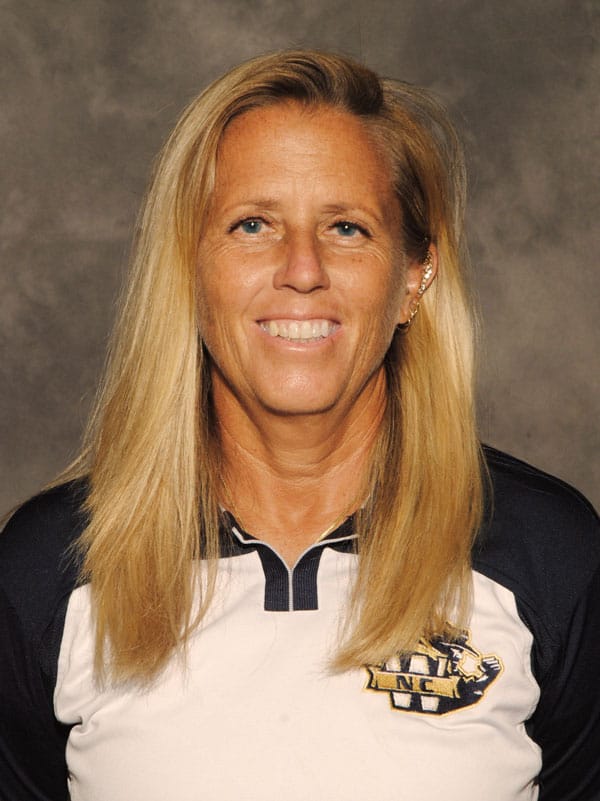
ROCKY MOUNT, NORTH CAROLINA – NCWU Women’s Soccer Coach, Beverly A. Biancur was chosen as one of five candidates for the position of Vice President to serve on the United Soccer Coaches Board of Directors.
The United Soccer Coaches by-laws require all elections for Board of Directors positions to include two to five candidates on the final ballot. In this case, Biancur was incredibly honored to be one of five represented. To ensure integrity, voting was completed by the third-party service, Intelliscan. Personalized ballots were sent out via email to members of United Soccer Coaches beginning on Tuesday, January 2, 2024. Voting concluded on January 12.
While Biancur did not win, she felt incredibly appreciated stating, “I was honored to be nominated and hope to remain in consideration for future positions”. Winner, Nancy Feldman, was the former Head Coach of Women’s Soccer at Boston University. “Nancy will do an exceptional job on the Board,” Biancur noted.
Serving on the Board of Directors is the ultimate way for a coach to give back to the association and the game as a whole. Feldman will have a six-year cycle on the Board. During that time, she will spend four years as Vice President, ascend to President and then serve a final year on the Board as Past President.
Currently in her sixteenth year at the University, Biancur has been Head Coach of NCWU Women’s Soccer for twelve years. In all, she boasts over twenty-five years of coaching experience at the collegiate, high school and club levels. Her podcast has gained a lot of interest from the coaching body and is available on the United Soccer Coaches Podcast.
NCWU is the Pet-Friendly College for Animal Lovers

Research shows that pet ownership in the United States has significantly increased over the past three decades. In fact, according to Forbes Advisor, “As of 2023, 66% of U.S. households (86.9 million homes) own a pet.” Personally, it comes as no surprise with everything that has occurred in the last several years: the pandemic, rise in mental health and rate of inflation. So, what about college-bound animal lovers who own a pet and are looking for a pet-friendly college?
In the fall of 2023, NC Wesleyan University announced its plan to turn one residence hall into pet-friendly housing, thanks to a new program the University is piloting. This initiative allows students to keep their furry friends with them while living on campus, offering them the ability to still have access to the traditional campus life experience. One pet per student is allowed.
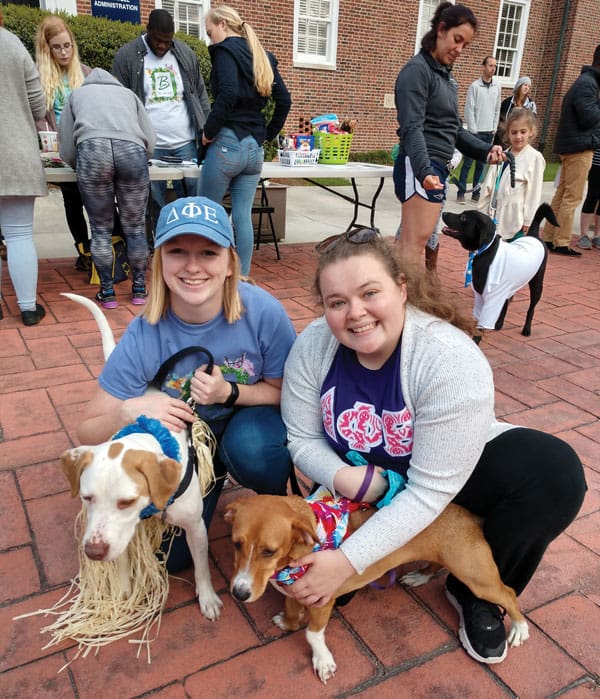
The unique program has proved to be popular among students, as spots in the residence hall filled up quickly with the announcement. NCWU plans to move forward in the upcoming 2024-2025 academic year continuing to offer pet-friendly housing. The University’s pet-friendly housing policy is for dogs, cats and fish. Dogs must weigh under 40 pounds and have no history of aggressive behavior. All dogs and cats are required to be vaccinated against rabies and other transmittable diseases and be on anti-parasite medication. No animals may roam the campus unattended. Fish tanks are limited to 5 gallons in volume.
In addition to the joy and companionship they bring, pets also teach time and obligation management. A great remedy for anxiety and homesickness, they provide many students more structure in their daily routine, including exercise and time outside. Not to mention they can be a great icebreaker for making new friends.
At NCWU, we are committed to providing a safe and well-maintained environment for all students residing in pet-friendly housing. It is the responsibility of the pet owner to protect the rights of all students, ensure a safe and healthy living and learning environment, as well as practice behaviors that support the upkeep of university facilities and beauty of the campus. Students who bring a pet to campus are responsible for understanding and abiding by the regulations of the pet policy. Every pet owner is encouraged to carefully consider the advantages and disadvantages of the campus environment for their pet.
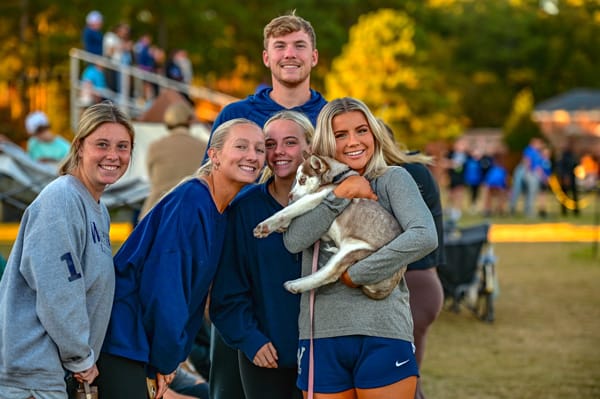
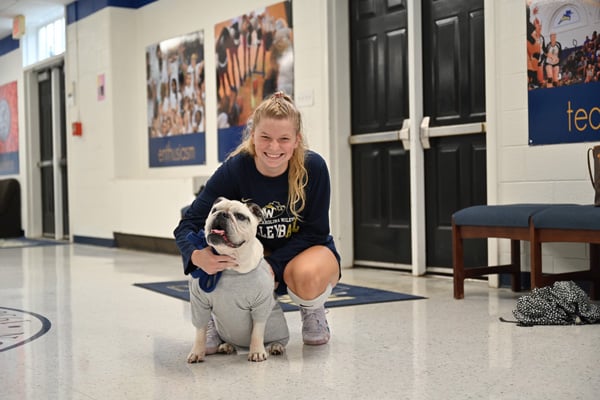
By allowing resident students to bring their pet to live on campus, we aim to create a more balanced college experience and be the “Pet-Friendly College for Animal Lovers”. An environment that prioritizes health, wellness and connection.
If you’re a pet owner interested in college and can’t bear to leave your beloved animal companion behind, check out North Carolina Wesleyan University. The University’s Winter Open House is set for Saturday, February 3, 2024, and registration is underway.
During Open House, students learn more about scholarships and financial aid, have the opportunity to speak with faculty and current students, gain information on the admissions process and can take a campus tour. You can learn more at ncwu.edu/admissions.
Bob Ross Exhibition A Fantastic Little Success
Fantastic Little Paintings by artist, Bob Ross, adorned the walls of The Mims and Gravely Galleries at The Dunn Center from November 2, 2023 through January 4, 2024. It was the first time a Bob Ross exhibition had been to North Carolina and the largest, with over 75 paintings, ever seen under one roof globally. More than 11,000 visitors poured in from all over the world to see this once-in-a-lifetime exhibit during the two-month showing.
Gallery Art Curator Jan Volz expressed, “The response to this exhibit was absolutely incredible. From corporate gatherings to individual ticket holders, people came from far and wide to be a part of this experience. We had visitors from Connecticut, Minnesota, California, Maine, Texas and even London, England.
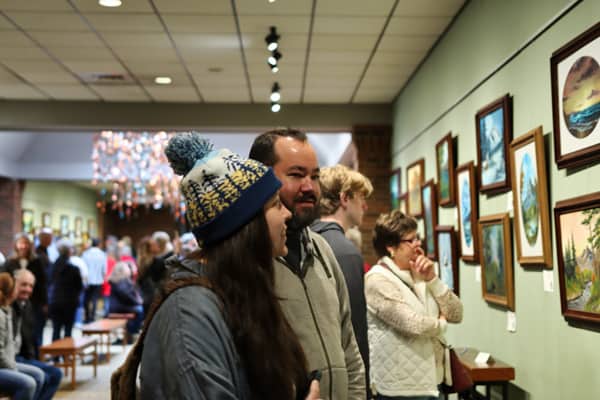
Robert Norman Ross, an American painter, art instructor and television host known by so many for his permed hair, showed the world how to paint fun pieces of art. He was the creator and host of The Joy of Painting, an instructional television program that aired from 1983 to 1994 on PBS in the United States, CBC in Canada, and similar channels in Latin America, Europe and elsewhere. Ross subsequently became known through his posthumous internet presence.
Bob Ross, Inc. President Joan Kowalski traveled to North Carolina to be part of the exhibition kick-off. “It was a joy to have her with us as we officially opened the doors to this exciting once-in-a-lifetime opportunity,” stated Sheila Martin, Executive Director of The Dunn Center. Joan shook hands, took photos, shared stories and was an extra little surprise for those attending opening day.
Later in November, special guest Jim Needham visited the exhibition. Described as “The Real Deal” and retired General Manager of PBS affiliate WIPB-TV, he is also known as Bob’s best friend and producer of The Joy of Painting TV show. Needham joined us on campus to celebrate the life and work of Ross with “Remembering Bob Ross… a Conversation with his Best Friend.” Telling stories of their time together, he presented “The Real Story” and was available to answer questions about the legendary man behind all of the Fantastic Little Paintings. A huge success, this exhibit was made possible by Bob Ross, Inc. and proceeds will go toward benefiting NCWU students and to help bring future artists to the galleries at The Dunn Center. To stay abreast of upcoming shows and art galleries coming to The Dunn Center sign-up to receive email updates at ncwu.edu/artgalleries.




